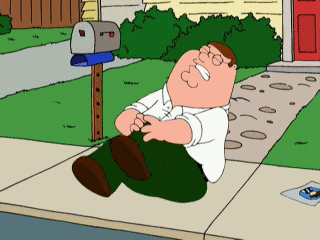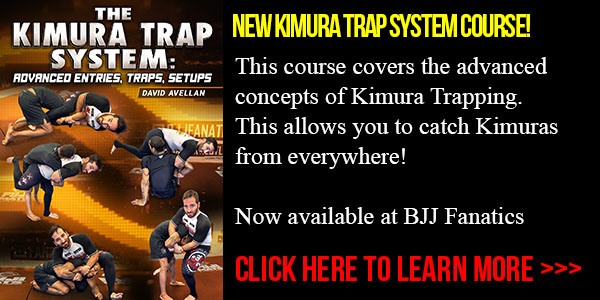It all happens so quickly. I setup the truck from fours, and right away got a hold of his toes to finish the calf slicer. I was slowly applying pressure to finish the hold, but my partner spazzed out to escape and my knee popped.
Unfortunately, one of the consequences of dealing with a sport that sole objective is to maim someone is that you might be that someone. Being smart helps avoid it, but even the wisest of grapplers may get injured.
In this case, I made a couple of mistakes. First, I was going too slow. The calf slicer from the truck is not the safest position to be at (sometimes they can counter with their own calf slicer), and being too nice here was a liability. Second, I have hurt myself in the exact same way about 7 years ago. That time I was doing a calf slicer on UFC contender Jorge Masvidal, and after a spazzing my knee popped. So I’m just bit going to do calf slicers anymore to avoid this possibility of injury in this fashion.
Third, I should be doing yoga. My girlfriend, who is a doctor and a practitioner of yoga for over 13 years, did a simple diagnostic and believes I didn’t damage any of the 3 letter ligaments of the knee (PCL, LCL, ACL, MCL), but instead thinks it was my IT band, a tendon that runs from the hip to the outside of the knee. Improved flexibility could have helped avoid this injury, as based on my other side my IT bands are tight.
This little break down is one step to dealing with an injury – figuring out what went wrong and how to prevent it from happening again in the future. But that doesn’t help me too much in healing.
As soon as you are injured, stop! Only you will usually know this, as after this incident my partner and others were waiting to train some more. At the moment, I could have pushed through and continued to train, but I could have only made the injury worse. This was just 5 minutes into training, so the temptation to push is there, but not worth the damage.
Next is RICE – Rest, Ice, Compression, and Elevation. This is a common approach to dealing with an acute injury to help reduce swelling.
Brace yourself for the next morning. No matter how good you are feeling at the moment, I can almost guarantee you that it will feel worse the next day. How you wake up the next morning is usually the worst of the injury, so be prepared for dealing with some pain and discomfort.
Set a recovery goal. Goals are important in all aspects of life. For recovery, they are just as vital. You need to set an expectation of what you plan on being able to achieve. What things you will need to do to rehabilitate, how long it will take, what you will be able to do once fully recover.
Keep coming to class. The worst thing you can do is sit at home and wallow in your own misery playing video games and watching TV. Now you shouldn’t be training at this point, but it doesn’t mean you can’t come to class. Just bring a note book and watch class to take notes. I believe an important part of healing comes from the mind being motivated to be better. Your body is LAZY. If you just lay in bed all day, your body will atrophy and the muscles you worked so hard to develop will disappear. Why? Because having more muscle uses more energy, and your body wants to be efficient and not have any excess muscle it doesn’t need. So if you are not using it, you lose it. Likewise, if when you get injured you disappear from training, you body doesn’t have a sense of urgency to recover quickly. What for? Playing video games? You don’t need a healthy body to do that.
But if you are sitting on the side lines taking notes, subconsciously you are on the mats. I believe your body takes that into account to speed things along, and help you make smarter decisions for your recovery. Plus, you don’t break that habit of coming to class – which for many people was difficult to make in the first place.
Do as much as you can do WITHOUT pain. Pain is a signal that something is wrong, and when you have an injury, that usually means you are making it worse. So we need to respect that, but do not be afraid of doing activities that are pain free. In fact, embrace them and do them as much as possible. Unless you have a severe injury where you are completely incapacitated, there has to be something you can do physically. That can mean stretching, weight training, or plyometrics.
Always stay positive. Above all things, keeping a positive mind set is the most important part of your recovery. It is natural to get depressed, frustrated, and angry when getting injured. But none of those emotions will help you recover – so don’t give them room in your mind. Instead, focus on getting back to 100%, and stay motivated. Watch movies, read books, or talk to inspirational people to keep your head on right. Trust me, whatever injury you are dealing with, there is someone who has dealt with FAR worse that went on to climb Mount Everest.
Consult with a doctor. If you can, it is always a good idea to get a doctor to inspect your injury. You want to be sure there isn’t anything serious you are not aware of (broken bones, pinched nerves, etc) that can be an immediate health risk. If you are experiencing numbness or tingling after an injury, that is usually a sign of a nerve problem. Sometimes it is just irritation from a swollen joint causing the nerve to fire unexpectedly. But if it is prolonged numbness, go to a doctor. We are in a tough sport, and we all have learned to endure a significant amount of pain. But there is a difference between being tough and being foolish – sometimes it is hard to tell, but deep down we know which is which.
At the end of the day, our health is the most important thing we have. Treasure it, protect yourself, and do the right things to maintain it. As for me, I was injured on Saturday, but fortunately the injury was minor. I am now barely limping, and will be watching class for the next few days, and start training lightly next week. So I will be practicing what I’m preaching. 🙂



